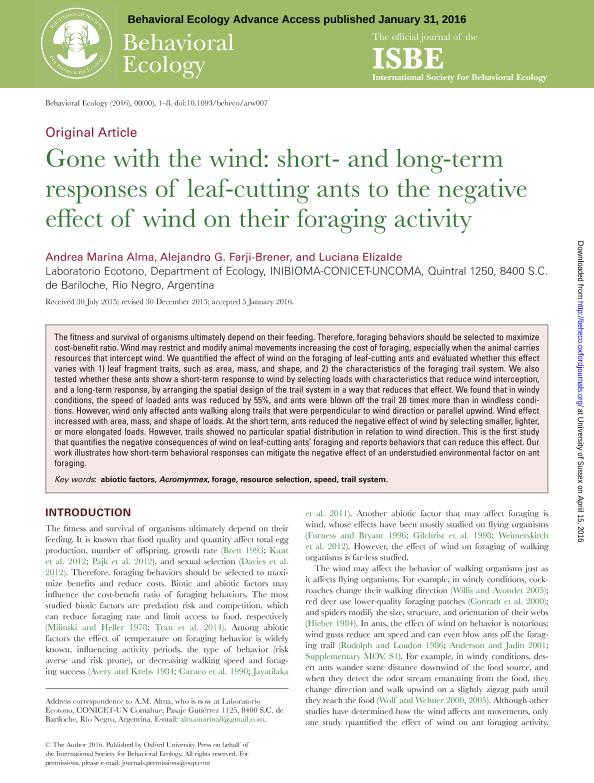Mostrar el registro sencillo del ítem
dc.contributor.author
Alma, Andrea Marina

dc.contributor.author
Farji Brener, Alejandro Gustavo

dc.contributor.author
Elizalde, Luciana

dc.date.available
2018-09-27T15:35:09Z
dc.date.issued
2016-01
dc.identifier.citation
Alma, Andrea Marina; Farji Brener, Alejandro Gustavo; Elizalde, Luciana; Gone with the wind: Short- and long-term responses of leaf-cutting ants to the negative effect of wind on their foraging activity; Oxford Univ Press Inc; Behavioral Ecology; 27; 4; 1-2016; 1017-1024
dc.identifier.issn
1045-2249
dc.identifier.uri
http://hdl.handle.net/11336/61057
dc.description.abstract
The fitness and survival of organisms ultimately depend on their feeding. Therefore, foraging behaviors should be selected to maximize cost-benefit ratio. Wind may restrict and modify animal movements increasing the cost of foraging, especially when the animal carries resources that intercept wind. We quantified the effect of wind on the foraging of leaf-cutting ants and evaluated whether this effect varies with 1) leaf fragment traits, such as area, mass, and shape, and 2) the characteristics of the foraging trail system. We also tested whether these ants show a short-term response to wind by selecting loads with characteristics that reduce wind interception, and a long-term response, by arranging the spatial design of the trail system in a way that reduces that effect. We found that in windy conditions, the speed of loaded ants was reduced by 55%, and ants were blown off the trail 28 times more than in windless conditions. However, wind only affected ants walking along trails that were perpendicular to wind direction or parallel upwind. Wind effect increased with area, mass, and shape of loads. At the short term, ants reduced the negative effect of wind by selecting smaller, lighter, or more elongated loads. However, trails showed no particular spatial distribution in relation to wind direction. This is the first study that quantifies the negative consequences of wind on leaf-cutting ants' foraging and reports behaviors that can reduce this effect. Our work illustrates how short-term behavioral responses can mitigate the negative effect of an understudied environmental factor on ant foraging.
dc.format
application/pdf
dc.language.iso
eng
dc.publisher
Oxford Univ Press Inc

dc.rights
info:eu-repo/semantics/openAccess
dc.rights.uri
https://creativecommons.org/licenses/by-nc-sa/2.5/ar/
dc.subject
Abiotic Factors
dc.subject
Acromyrmex
dc.subject
Forage
dc.subject
Resource Selection
dc.subject
Speed
dc.subject
Trail System
dc.subject.classification
Otras Ciencias Biológicas

dc.subject.classification
Ciencias Biológicas

dc.subject.classification
CIENCIAS NATURALES Y EXACTAS

dc.title
Gone with the wind: Short- and long-term responses of leaf-cutting ants to the negative effect of wind on their foraging activity
dc.type
info:eu-repo/semantics/article
dc.type
info:ar-repo/semantics/artículo
dc.type
info:eu-repo/semantics/publishedVersion
dc.date.updated
2018-09-24T14:12:37Z
dc.journal.volume
27
dc.journal.number
4
dc.journal.pagination
1017-1024
dc.journal.pais
Reino Unido

dc.journal.ciudad
Oxford
dc.description.fil
Fil: Alma, Andrea Marina. Consejo Nacional de Investigaciones Científicas y Técnicas. Centro Científico Tecnológico Conicet - Patagonia Norte. Instituto de Investigaciones en Biodiversidad y Medioambiente. Universidad Nacional del Comahue. Centro Regional Universidad Bariloche. Instituto de Investigaciones en Biodiversidad y Medioambiente; Argentina
dc.description.fil
Fil: Farji Brener, Alejandro Gustavo. Consejo Nacional de Investigaciones Científicas y Técnicas. Centro Científico Tecnológico Conicet - Patagonia Norte. Instituto de Investigaciones en Biodiversidad y Medioambiente. Universidad Nacional del Comahue. Centro Regional Universidad Bariloche. Instituto de Investigaciones en Biodiversidad y Medioambiente; Argentina
dc.description.fil
Fil: Elizalde, Luciana. Consejo Nacional de Investigaciones Científicas y Técnicas. Centro Científico Tecnológico Conicet - Patagonia Norte. Instituto de Investigaciones en Biodiversidad y Medioambiente. Universidad Nacional del Comahue. Centro Regional Universidad Bariloche. Instituto de Investigaciones en Biodiversidad y Medioambiente; Argentina
dc.journal.title
Behavioral Ecology

dc.relation.alternativeid
info:eu-repo/semantics/altIdentifier/doi/https://dx.doi.org/10.1093/beheco/arw007
dc.relation.alternativeid
info:eu-repo/semantics/altIdentifier/url/https://academic.oup.com/beheco/article/27/4/1017/1742734
Archivos asociados
